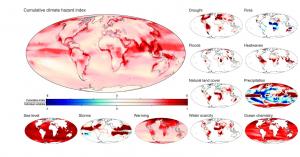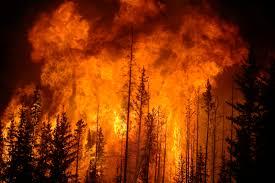
Greenhouse gas triggering more changes than we can handle
From UH News, Nov 19, 2018
A new study published in Nature Climate Change provides one of the most comprehensive assessments yet of how humanity is being impacted by the simultaneous occurrence of multiple climate hazards strengthened by increasing greenhouse gas emissions. This research reveals that society faces a much larger threat from climate change than previous studies have suggested.
An analysis of thousands of peer-reviewed scientific papers reveals 467 ways in which human health, food, water, economy, infrastructure, and security have been impacted by multiple climatic changes including: warming, drought, heatwaves, wildfires, precipitation, floods, storms, sea level rise and changes in land cover and ocean chemistry.
Until now, with few exceptions, climate hazards due to greenhouse gas emissions have been studied individually. However, focusing on one or few hazards may mask the impacts of other hazards resulting in incomplete assessments of the consequences of climate change on humanity.
Ongoing greenhouse gas emissions are known to increase atmospheric temperature, in turn enhancing soil water evaporation resulting in drought, wildfires and heatwaves in normally dry places, or massive rain and floods in commonly wet areas. In the oceans, warmer waters also evaporate faster, increasing wind speeds and the downpours of hurricanes, whose surges can be aggravated by sea level rise. As a result, greenhouse gas emissions can aggravate simultaneously multiple climate hazards.
In a systematic review of thousands of papers, the study details 467 ways of how these hazards have already impacted human health, including death, disease and mental wellbeing; food supply from animals and plants on land and sea; quantity and quality of freshwater; infrastructure including electricity, transportation and “life line” services such as water and sewage lines, and economic losses including property damage and reduced labor productivity; all while triggering multiple cases of migrations and violence. Over 3,000 documented case examples, with supporting papers, are listed at http://impactsofclimatechange.info/.

“Greenhouse gas emissions pose a broad threat to humanity by simultaneously intensifying many hazards that have proven harmful in the past,” said lead author Camilo Mora, associate professor of geography in the College of Social Sciences at UH Mānoa “Further, we predict that by 2100 the number of hazards occurring concurrently will increase, making it even more difficult for people to cope.”
The study, co-authored by 23 scientists, combines exhaustive data mining and the technological abilities of Mora’s graduate students analyzing vast amounts of big data, with the long-time expertise of veteran climate scientists, including several lead authors on the Intergovernmental Panel on Climate Change (IPCC) reports.
In the year 2100, for instance, New York is projected to face up to four climate hazards, if greenhouse gas emissions are not mitigated, including sea-level rise and extreme precipitation. That same year, Sydney and Los Angeles will face three concurrent climate hazards, Mexico City will face four, and the Atlantic coast of Brazil will face five. Even under strong mitigation scenarios, increasing cumulative exposure to the multitude of climate hazards will impact rich and poor countries alike and especially in tropical coastal areas.
A web-application that accompanies the paper allows users to see the cumulative number of climate hazards likely to occur anywhere on Earth, under different emissions scenarios through 2100 (https://maps.esri.com/MoraLab/CumulativeChange/index.html, see figure).
“The study is a compelling review of how climate change is literally redrawing lines on the map, clearly showing the threats that our world faces at every level," said Dawn Wright, ESRI Chief Scientist. The maps and data hammer home how much danger humanity truly faces, and the need for immediate action.
"Our health depends on multiple factors, from clean air and water, to safe food and shelter and more," said co-author Jonathan Patz, Professor and Director of the University of Wisconsin's Global Health Institute. "So without a real systems approach to climate change impacts, we cannot adequately understand the full risks. If we only consider the most direct threats from climate change, for example heatwaves or severe storms, we inevitably will be blindsided by even larger threats that, in combination, can have even broader societal impacts.”
Michael 'Hockey Sthick' Mann, Distinguished Professor of Atmospheric Science at Penn State University who was not involved in the study said, “This new research provides rigorous, quantitative support for a point we have emphasized for some time: the costs of inaction greatly outweigh the costs of taking action on climate change. It also provides robust support for another key point: we can still reduce future damage and suffering if we act quickly and dramatically to reduce carbon emissions.”
“The collision of cumulative climate hazards is not something on the horizon, it is already here,” said Mora. “Co-occurring and colliding climate hazards are already making headlines worldwide. Last year, for instance, Florida recorded extreme drought, record high temperatures, over 100 wildfires, and the strongest ever recorded hurricane in its Panhandle: the category 4 Hurricane Michael. Likewise, California is currently experiencing ferocious wild fires and one of the longest droughts, plus extreme heatwaves this past summer.”
“The evidence of climate change impacting humanity is abundant, loud and clear,” said UH Mānoa Assistant Professor Daniele Spirandelli and co-author of the study. “Clearly, the outstanding question is—how many wake up calls will it take to wake up?”
The paper concludes urgently: “Overall, our analysis shows that ongoing climate change will pose a heightened threat to humanity that will be greatly aggravated if substantial and timely reductions of greenhouse gas emissions are not achieved.”
FAQs at www.soc.hawaii.edu/mora/Private/CumulativeHazards/Paper.html User: “cumulative”, password = “mora@96822”
Coverage: